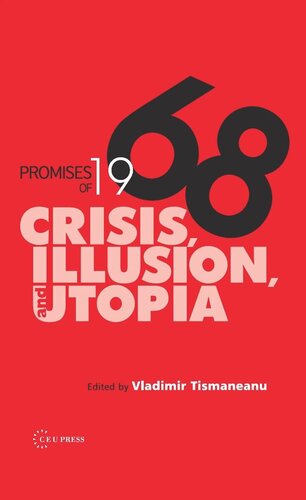

Most ebook files are in PDF format, so you can easily read them using various software such as Foxit Reader or directly on the Google Chrome browser.
Some ebook files are released by publishers in other formats such as .awz, .mobi, .epub, .fb2, etc. You may need to install specific software to read these formats on mobile/PC, such as Calibre.
Please read the tutorial at this link: https://ebookbell.com/faq
We offer FREE conversion to the popular formats you request; however, this may take some time. Therefore, right after payment, please email us, and we will try to provide the service as quickly as possible.
For some exceptional file formats or broken links (if any), please refrain from opening any disputes. Instead, email us first, and we will try to assist within a maximum of 6 hours.
EbookBell Team

0.0
0 reviewsThis book is a state of the art reassessment of the significance and consequences of the events associated with the year 1968 in Europe and in North America. Since 1998, there hasn't been any collective, comparative and interdisciplinary effort to discuss 1968 in the light of both contemporary headways of scholarship and new evidence on this historical period. A significant departure from earlier approaches lies in the fact that the manuscript is constructed in unitary fashion, as it goes beyond the East–West divide, trying to identify the common features of the sixties. The latter are analyzed as simultaneously global and local developments. The main problems addressed by the contributors of this volume are: the sixties as a generational clash; the redefinition of the political as a consequence of the ideological challenges posed to the status-quo by the sixty-eighters; the role of Utopia and the de-radicalization of intellectuals; the challenges to imperialism (Soviet/American); the cultural revolution of the sixties; the crisis of 'really existing socialism' and the failure of "socialism with a human face"; the gradual departure from the Yalta-system; the development of a culture of human rights and the project of a global civil society; the situation of 1968 within the general evolution of European history (esp. the relationship of 1968 with 1989). In contrast to existing books, it provides a fundamental and unique synthesis of approaches on 1968: first, it contains critical (vs. nostalgic) re-evaluations of the events from the part of significant sixty-eighters; second, it includes historical analyses based on new archival research; third, it gathers important theoretical re-assessments of the intellectual history of the 1968; and fourth, it bridges 1968 with its aftermath and its pre-history, thus avoiding an over-contextualization of the topics in question.